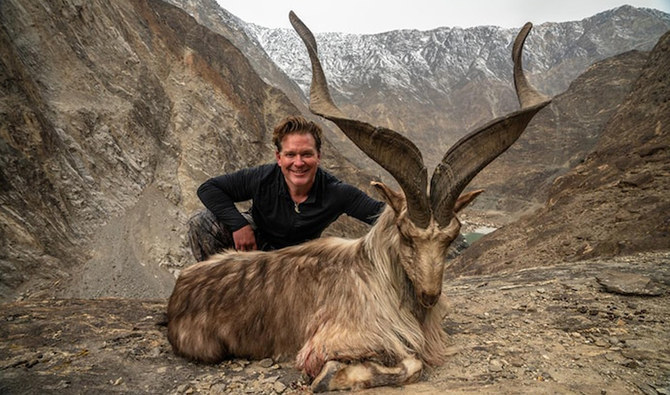ISLAMABAD: Pakistan’s permanent ambassador to the United Nations on Wednesday called on the international community to join hands to conserve the South Asian country’s national animal Markhor, given the important role it plays in the overall ecosystem.
The Markhor is a large, wild goat with distinctive spiral horns found in the mountainous regions of Pakistan, India, Afghanistan, Tajikistan, and Uzbekistan. They are usually found at heights of 8,000-11,000 feet, but during the winter months, descend to between 5,000-6,000 feet.
Markhors are hunted for sport in Pakistan’s mountainous Gilgit-Baltistan region, where its hunting license fee is one the highest in the world.
“Pakistan has urged the world community to espouse collaborative efforts for the conservation of the Markhor,” the state-run Associated Press of Pakistan (APP) said. Pakistan’s envoy to the UN, Munir Akram, said the animal holds special significance for Pakistan considering it is the country’s national animal.
Akram was speaking at a UN side event organized by the Tajikistan Mission to the UN. The event was held in collaboration with the UN Environment Programme and International Union for Conservation of Nature.
“Markhors offer a significant opportunity to bolster the economy, foster conservation efforts and promote sustainable tourism and economic growth,” Akram was quoted as saying by the APP.
He noted that while the population of Markhors was declining globally, in Pakistan the animal was increasing steadily due to the government’s proactive conservation programs and community engagement policies.
He said currently, there were somewhere between 3,500 to 5,000 markhors in Pakistan.
“In Pakistan’s experience, strengthening community governance structures and promoting local ownership over sustainable natural resource use is a crucial first step to building more capacity for wildlife management activities,” Akram said.
He pointed out that under Pakistan’s trophy hunting policy, local communities are trained to monitor and manage Markhor populations and trophy hunts independently. These communities retain 80 percent of the trophy permit fees, creating strong incentives for conservation, leading to significant livelihood improvements and community development projects, he said.
Akram noted that proceeds from the trophy hunts were also spent on enhancing Markhor breeding spaces and habitats.
















